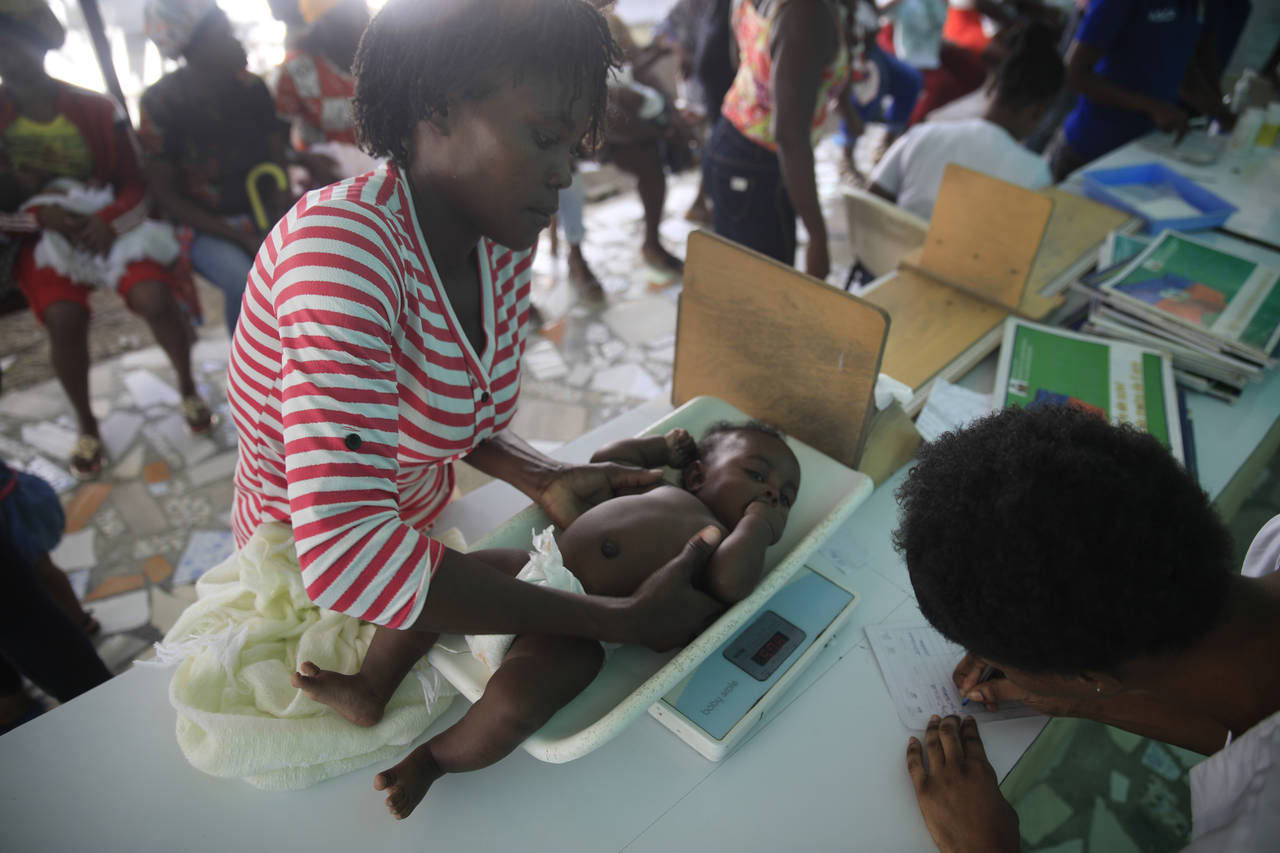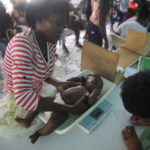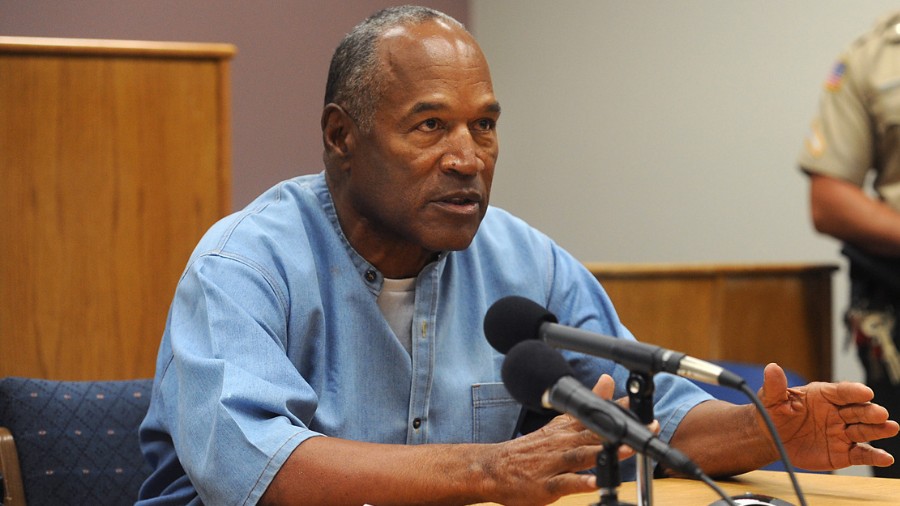In heart of Haiti’s gang war, one hospital stands its ground
Feb 25, 2023, 5:09 PM | Updated: Feb 26, 2023, 4:32 pm

A health worker weighs a child at the Fontaine Hospital Center where the baby got multiple vaccinations during the visit in the Cité Soleil area of Port-au-Prince, Haiti, Monday, Jan. 23, 2023. As gangs tighten their grip on Haiti, many medical facilities in the Caribbean nation's most violent areas have closed, leaving Fontaine as one of the last hospitals and social institutions in one of the world's most lawless places. (AP Photo/Odelyn Joseph)
(AP Photo/Odelyn Joseph)
PORT-AU-PRINCE, Haiti (AP) — When machine gun fire erupts outside the barbed-wire fences surrounding Fontaine Hospital Center, the noise washes over a cafeteria full of tired, scrub-clad medical staff.
And no one bats an eye.
Gunfire is part of daily life here in Cité Soleil – the most densely populated part of the Haitian capital and the heart of Port-au-Prince’s gang wars.
As gangs tighten their grip on Haiti, many medical facilities in the Caribbean nation’s most violent areas have closed, leaving Fontaine as one of the last hospitals and social institutions in one of the world’s most lawless places.
“We’ve been left all alone,” said Loubents Jean Baptiste, the hospital’s medical director.
Fontaine can mean the difference between life and death for hundreds of thousands of people just trying to survive, and it offers a small oasis of calm in a city that has descended into chaos.
The danger in the streets complicates everything: When gangsters with bullet wounds show up at the gates, doctors ask them to check their automatic weapons at the door as if they were coats. Doctors cannot return safely to homes in areas controlled by rival gangs and must live in hospital dormitories. Patients who are too scared to seek basic care due to the violence arrive in increasingly dire condition.
Access to health care has never been easy in Haiti, the poorest nation in the Western Hemisphere. But late last year it suffered a one-two punch.
One of Haiti’s most powerful gang federations, G9, blockaded Port-au-Prince’s most important fuel terminal, essentially paralyzing the country for two months.
At the same time, a cholera outbreak made worse by gang-imposed mobility restrictions brought the Haitian health care system to its knees.
The U.N. high commissioner for human rights, Volker Türk, said this month that violence between G9 and a rival gang has turned Cité Soleil into “a living nightmare.”
Reminders of the desperation are never far away. An armored truck driven by hospital leaders passes by hundreds of mud pies baking in the harsh sun to fill the stomachs of people who can’t afford food. Black spray-painted “G9” tags dot nearby buildings, a warning of who’s in charge.
In a February report, the U.N. documented 263 murders between July and December in just the small area surrounding the hospital, noting that violence has “severely hampered” access to health services.
That was the case for 34-year-old Millen Siltant, a street vendor who sits in a hospital hallway waiting for a checkup, her hands nervously clutching medical paperwork over her pregnant belly.
Nearby, hospital staff play with nearly 20 babies and toddlers — orphans whose parents were killed in the gang wars.
Normally, Siltant would travel an hour across the city by colorful buses known as tap-taps for her prenatal checkups at Fontaine. There she would join other pregnant women waiting for exams and mothers cradling malnourished children in line for weigh-ins.
All the clinics in the area where she lives have closed, she said. For two months last year she couldn’t leave the house because gangs holding the city hostage made travel through the dusty, winding streets nearly impossible.
“Some days, there’s no transportation because there’s no fuel,” she said. “Sometimes there’s a shooting on the street and you spend hours unable to go outside … Now I’m worried because the doctor says I need to get a C-section.”
Health care providers told the Associated Press that the crisis has caused more bullet and burn wounds. It has also fueled an uptick in less predictable conditions such as hypertension, diabetes and sexually transmitted infections, largely because of slashed access to primary care.
Pregnant women are disproportionately affected. Gynecologist Phalande Joseph sees the repercussions every day when she leaves her hospital dormitory and pulls on her light blue scrubs.
The young Haitian doctor snaps on a pair of white surgical gloves and makes an incision into a pregnant patient’s belly with a steady hand that only comes with practice.
She works swiftly, conversing with medical staff in her native Creole, when a burst of wailing erupts from a baby girl nurses swaddle in pink blankets.
Operations like these have grown more common, Joseph explains in between C-sections, because the very conditions that have intensified amid the turmoil can turn a pregnancy from high risk to deadly.
This year, 10,000 pregnant women in Haiti could face fatal obstetric complications due to the crisis, according to U.N. data.
Those risks are only compounded by the fact that many of Joseph’s patients are sexual violence survivors or widows whose husbands were killed by gangs. Permeating the struggle is an air of fear.
“If they start having contractions at 3 a.m., they are terribly scared of coming here because it is too early, and they are scared something might happen to them because of the gangs,” Joseph said. “Many times when they arrive, the baby is already suffering, and it is too late so we need to do C-section.”
That became most evident to Joseph last October when four men came rushing to a hospital carrying a woman giving birth stretched out on top of a door. Because of gang lockdowns, the woman couldn’t find any transportation to the hospital after her water broke.
“These four men were not even her family. They found her delivering on the street … When I heard she lost the baby, it shook me,” she said. “The situation in my country is so bad, and there is not much we can do about it.”
Started as a one-room clinic to provide basic medical services to a community with no other resources, Fontaine Hospital Center was opened in 1991 by Jose Ulysse.
Ulysse and his family have worked to expand the hospital year after year. They fight to keep their doors open, Ulysse said.
Even when firefights arrive at the doors of Fontaine, the hospital reopens few hours later. If it were to close for longer, administrators worry that it could lose momentum and would be hard to reopen.
Today, it’s the only facility to perform C-sections and other high-level surgeries in Cité Soleil.
Because most of the people in the area live in extreme poverty, the hospital charges little to nothing to patients even as it struggles to purchase advanced medical equipment with funds from UNICEF and other international aid providers. Between 2021 and 2022, the facility saw a 70% jump in the number of patients.
The hospital possesses a certain level of protection because it accepts all patients.
“We don’t pick sides. If the two groups face off, and they arrive at the hospital like any other person, we treat them,” Jean Baptiste said.
Even the gangs understand the importance of medical care, he added. Yet the walls still feel like they’re closing in.
Rising carjackings of medical vehicles have made it impossible for Fontaine to invest in an ambulance. When ambulance operators are called from areas like Cité Soleil, they offer a simple response: “Sorry, we can’t go there.”
Fontaine’s mobile clinic can now travel little more than a few blocks outside the facility’s walls.
Doctors worry, but they keep working, just as they’ve always done.
“You say, well, I have to work. So let God protect me,” Jean Baptiste said. “As this situation gets worse, we go out and decide to face the risks. … We have to keep pushing forward.”
Copyright © The Associated Press. All rights reserved. This material may not be published, broadcast, rewritten or redistributed.




















